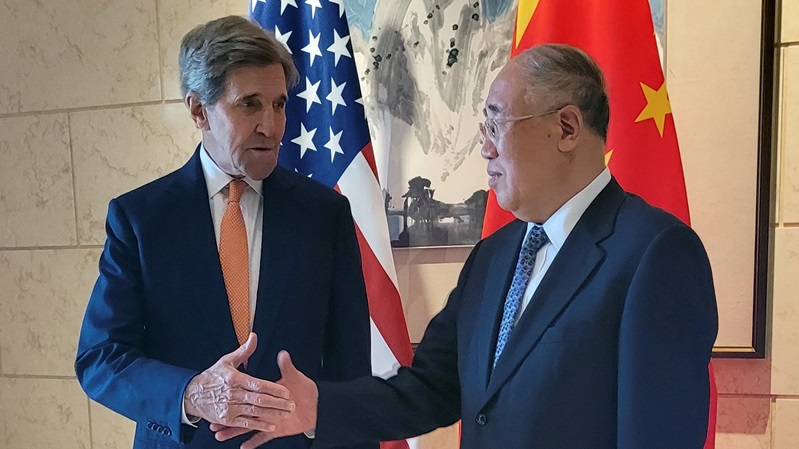The United States and China will back a new global renewables target and work together on methane and plastic pollution, they said in a joint statement on Wednesday after a meeting to find common ground ahead of Cop28 talks in Dubai later this month.
Climate envoys John Kerry and Xie Zhenhua, meeting in Sunnylands, California on 4-7 November, agreed to revive a bilateral climate working group that will discuss areas of cooperation between the two countries, the joint statement said, though differences remain on issues like phasing out fossil fuels.
“The Sunnylands statement is a timely effort of aligning the United States and China ahead of Cop28,” said Li Shuo, incoming director of the China Climate Hub at the Asia Society.
Li described the relationship between the world’s two biggest greenhouse gas emitters as “a precondition for meaningful global progress” and said the Sunnylands agreement will help “stabilise the politics” ahead of Dubai talks.
The US and China’s resurgent climate cooperation is a big deal
The re-launch of the working group marks the normalisation of the climate relationship between the two countries following a hiatus triggered in 2022 by the visit of former House of Representatives speaker Nancy Pelosi to Taiwan, a self-governing island that China claims.
It will focus on key areas of cooperation, including cutting methane emissions and boosting efficiency and the “circular economy”, and exchange information on policies and technologies to reduce emissions. The two sides also promised to work together to curb forest loss and plastic pollution.
Fossil fuel divide
China’s efforts to cut its own carbon emissions will be in sharp focus at the Cop28 talks, with the country still approving new coal-fired power plants in a bid to ensure energy security.
The United States and China said they support a declaration by G20 leaders to triple global renewable energy capacity by 2030, and also agreed to “accelerate the substitution for coal, oil and gas generation”.
The joint statement said they anticipate “meaningful” reductions in emissions from the power sector this decade, but it fell short of calling for the phasing out of fossil fuels, a goal that China has described as “unrealistic”.
Both sides also agreed to include methane in their 2035 climate goals – the first time China has made such a pledge – and committed to advancing “at least five” large-scale cooperation projects in carbon capture, utilisation and storage by the end of the decade.
Li said Cop28 still “has its work cut out”, particularly on fossil fuels.
“China also needs to consider what further ambition can be brought to COP,” he added. “Stopping the approval of new coal power projects is a good next step.”
